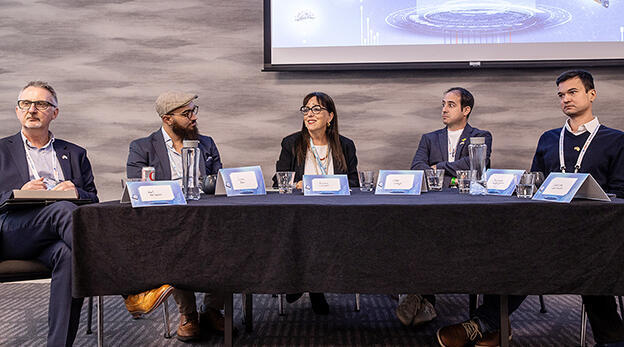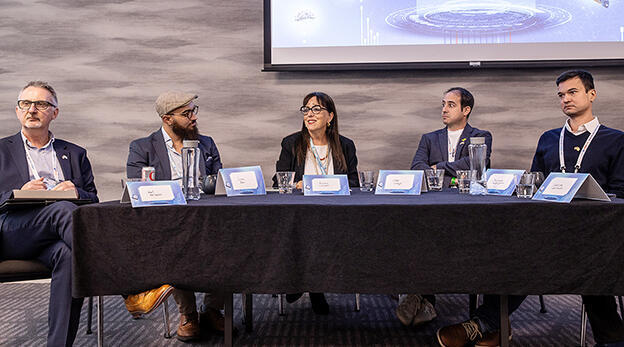
Mind the Tech London 2024
"London has the largest concentration of AI companies today"
Anita Leviant, President of the Israel-Britain Chamber of Commerce, said during a roundtable event at Mind the Tech London: "AI brings new and significant challenges, including the need for rules which necessary ethics."
"In London, the use of AI is easier, at least for now," said the panel participants of the Israel-Britian Chamber of Commerce and Innovation in collaboration with London & Partners and a team of experts, at Calcalist and Bank Leumi's Mind The Tech London conference. The panel included Anita Leviant, President of the Israel-British Chamber of Commerce; Neil Brigden, Investment Director at London & Partners; Sam Beni, Founder and Director at Platin VC; Ofer Shayo, Managing Director of Intel Ignite London and Adriano Koshiyama, Co-CEO of Holistic AI.
"We are in an era of rapid technological progress, and artificial intelligence is at the forefront, changing industries and redefining the way we work and live," according to Leviant, who added, "This change, known as the fourth industrial revolution, brings with it incredible opportunities, but also new and significant challenges, including the regulation and the need for rules that will ensure the maintenance of necessary ethics."
According to her, "In contrast to previous decades, where the majority of investors' tests focused on financial indicators and operational efficiency, today there is a clear desire to see the use of AI that will contribute to a company's efficiency and ability to compete. However, the use must be responsible and informed and in compliance with legislation and rules enforced by authorities in countries across the world and, precisely at this point, complex questions arise. Investors in the past were looking to invest in traditional fields and today they also want to see how AI is used, which is more competitive and useful. This comes with a huge amount of risk and it requires close examination."
The panel, which included British and Israeli experts from various fields, dealt with the perspective of investors looking at implementation of AI in companies, proper risk management from the companies' point of view, the opportunities alongside the challenges in changing regulation, as well as comparing UK regulation to the recent EU regulation, called the EU AI Act, and strategies for dealing with this regulation.
Neil Brigden, investment director at London & Partners, who were partners in organizing the panel, spoke of London as a preferred choice for high-tech companies thanks to the ecosystem that supports and leads globally in the field of innovation. He emphasized the UK's commitment to supporting innovation, including being a leader in the field of AI.
"People don't know how strong the local ecosystem in England and London is, and it is valued at trillions of dollars. London is the driving force of the industry and is behind 60% of the local industry and especially of companies that want to grow to a significant scale. In London, both powerful investors and the regulators are concentrated, unlike other countries where they spread across the whole country. Today there are 1,300 companies dealing with AI in London - more than New York and Paris."
Sam Beni spoke about the investors' point of view, as a veteran entrepreneur. "We have seen a huge interest in AI in the last two years. Its not a new field - the father of the field is Alan Turing. In the 2000s there was the mobile revolution and in 2010 AI started to return because of the cloud computing revolution, with billions invested in the field."
Ofer Shayo, who built the Intel Ignite program in London and before that was at AWS and an entrepreneur who accompanied thousands of start-ups, believes that AI should be used proportionately. He is aware of the dangers, sees the need for education in the correct use of tools and calls on the regulator to take responsibility for the issue.
"I have worked with many companies at Ignite, dozens of them here in London and many more around the world. Our role is to help entrepreneurs develop the suitability of the product for the market. I am looking for entrepreneurs who identify opportunities in the market. Entrepreneurs know how to identify the right risks and opportunities. I see using AI as using superpowers. If used correctly, it will elevate you and if used incorrectly it can destroy you. If you apply AI, it is clear to everyone the value of it but it also has risks, such as the use of inaccurate models, breaking cyber barriers and more."
Adriano Koshiyama, Co-CEO of Holistic AI, pointed out that the UK is not part of EU legislation and, in the meantime, the strict requirements, heavy expenses and fines that accompany them don't apply to those operating in the UK, but there is no doubt that the legislation will come. "One of the difficulties facing companies when it comes to implementing the rules of regulation is the lack of uniformity in the legislation between the different countries. The Asian market is very diverse and, in some parts, not much is happening, especially in Japan and Singapore in terms of regulation."
Beni pointed out that as far as privacy protection is concerned, there is really nothing new in the regulatory requirements regarding AI, since the issue of privacy has been regulated for years through the privacy regulations that apply to most of the world (GDPR). "Companies that use AI in one way or another must be aware of these rules in this context as well," he said.
Leviant, an international transactions lawyer and formerly a banker who consults with start-ups and investors, concluded, "We found it appropriate to try to equip the companies coming to the UK with insights on how to conduct themselves in this important field that we all touch in one way or another and not always with full awareness of the consequences. But, there is no doubt that companies today require a holistic approach that includes technology and ethics. The intersection of AI with the business world presents several new challenges for companies and investors alike. The fields are developing very quickly. Even though legislation cannot always catch up with the development of technology, there is no doubt that this important discourse must be continued and solutions must be found that will allow progress while maintaining values."














